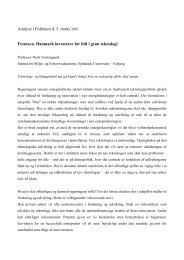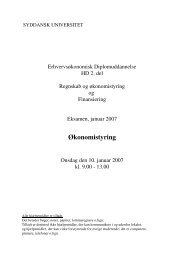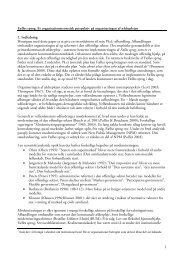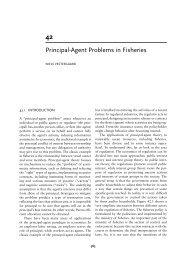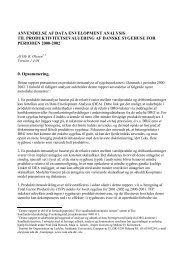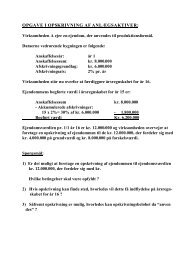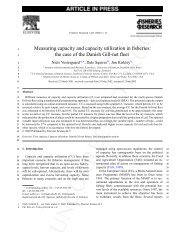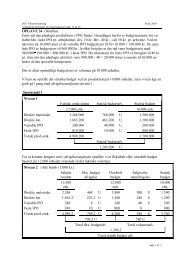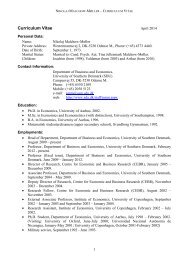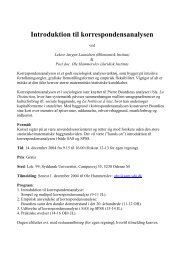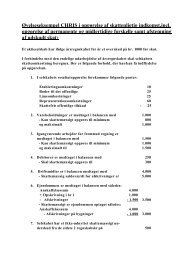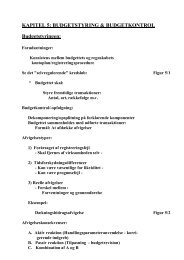Development of Parties and Party Systems in ... - lah@sam.sdu.dk
Development of Parties and Party Systems in ... - lah@sam.sdu.dk
Development of Parties and Party Systems in ... - lah@sam.sdu.dk
- No tags were found...
You also want an ePaper? Increase the reach of your titles
YUMPU automatically turns print PDFs into web optimized ePapers that Google loves.
After 1989 different types <strong>of</strong> political leaders emerged. Thus, the Hungarian Attila Ághdist<strong>in</strong>guishes between four groups:• “Politicians <strong>of</strong> morals”, who played a significant role <strong>in</strong> the first stage. They mostlyappealed to patriotic <strong>and</strong> national values.with references to their own “heroic past”. Aspoliticians they acted reserved, improvised, morally, non-pr<strong>of</strong>essionally <strong>and</strong> almostaristocratically, captured by a specific “liberation myth”. Pol<strong>and</strong>’s Jan Olszewski <strong>and</strong> theCzech Republic’s Vaclav Benda have been <strong>in</strong>cluded <strong>in</strong> that first group.• “Politicians <strong>of</strong> historical vision”. Politicians from that group <strong>of</strong>ten left the political sceneafter the demise <strong>of</strong> the old system. Before 1989 they had not been active dissidents. Aspoliticians they <strong>of</strong>ten based their arguments on idelogies <strong>and</strong> discourses go<strong>in</strong>g back to precommunisttimes. Before 1989, they had <strong>of</strong>ten entered compromises with the power holders.The political style was arrogant, not compromise seek<strong>in</strong>g <strong>and</strong> unpr<strong>of</strong>essional. Former primem<strong>in</strong>ister <strong>in</strong> Hungary Józef Antall <strong>and</strong> the christian democrat Jan carnogursky <strong>in</strong> Slovakiabelonged to that group. Also many politicians <strong>in</strong> the Baltic countries shared a feel<strong>in</strong>g <strong>of</strong>fullfill<strong>in</strong>g a historical mission reestablish<strong>in</strong>g <strong>in</strong>dependence after 50 years under communistrule. Nonetheless, many from that group had at some time been lead<strong>in</strong>g politicians under theold system., sometimes they explelled from the communist parties due to lack <strong>of</strong> partydiscipl<strong>in</strong>e.• “Politicians by chance”, i.e. persons who became “carried” <strong>in</strong>to politics because <strong>of</strong> the thenprevail<strong>in</strong>g extraord<strong>in</strong>ary politics <strong>and</strong> transition anomie. Several times people from that groupbecame embarassment for further consolidation <strong>of</strong> democracy due to their agressive selfpromot<strong>in</strong>gstyle <strong>and</strong> onesided aim<strong>in</strong>g at political career. Several from that group were<strong>in</strong>volved <strong>in</strong> political sc<strong>and</strong>als, <strong>and</strong> many absurd, <strong>of</strong>ten populist <strong>and</strong> xen<strong>of</strong>obic policalslogans. Stanislaw Tym<strong>in</strong>ski, Lech Walesa’s rival c<strong>and</strong>idate at the 1990 presidentialelection, Miroslav Sladek, the leader <strong>of</strong> the right w<strong>in</strong>g populistic repubican party <strong>in</strong> theCzech Republic, Istvan Czurka, the r<strong>in</strong>ght w<strong>in</strong>g nationalist <strong>in</strong> Hungary, <strong>and</strong> VladimirZjir<strong>in</strong>ovski, the leader <strong>of</strong> the populist Liberal Democratic <strong>Party</strong> <strong>in</strong> Russia, belonged to thatgroup.• The old nomenklatura, which to a great extent has survived. Especially the modern part <strong>of</strong>the nomenklatura made a good show<strong>in</strong>g. The conservative “beton-heads” either resignedfrom politics or turned themselves <strong>in</strong>to nationalists. Pol<strong>and</strong>’s president e <strong>and</strong> former leader<strong>of</strong> the left w<strong>in</strong>g SLD Aleks<strong>and</strong>er Kwasniewski <strong>and</strong> Hungary’s former foreign m<strong>in</strong>ister,prime m<strong>in</strong>ister Guyla Horn belonged to the “modern” <strong>and</strong> accomodate part <strong>of</strong> thenomaneklatura.• F<strong>in</strong>ally Attila Ágh mentiones the new pr<strong>of</strong>essionals, a mixture <strong>of</strong> old <strong>and</strong> new, mostlyconsist<strong>in</strong>g <strong>of</strong> experts <strong>and</strong> pr<strong>of</strong>essionals from the old regime or yungsters without any l<strong>in</strong>ksback <strong>in</strong> time. To the first generation <strong>of</strong> pr<strong>of</strong>essionals, people from the “second tier” <strong>of</strong> theold system, belonged Vaclav Klaus, the party leader <strong>of</strong> the liberal party ODS <strong>and</strong> later thepresident <strong>of</strong> the Czech Republic, <strong>and</strong> Leszek Balcerowicz, the former M<strong>in</strong>ister <strong>of</strong> F<strong>in</strong>ance,leader <strong>of</strong> the liberal Freedom Union (UW), later the Polsh national bank governor.In agreement with Atilla Ágh, András Bozóki from the Central European University <strong>in</strong> Budapest,breaks down <strong>of</strong> the new elite <strong>in</strong> this way:32



